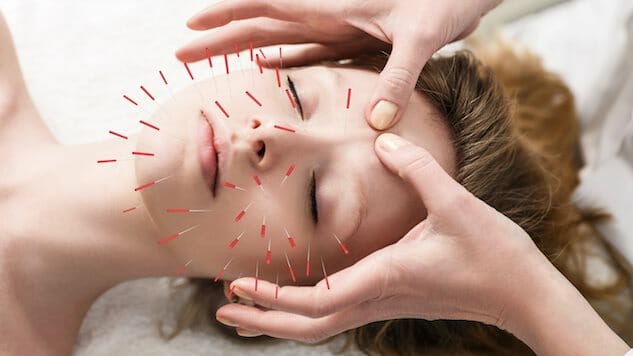You May Be Convinced to Try Acupuncture After Reading This
Main photo by Kotin/Shutterstock
This article is not meant to diagnose or provide medical advice—that responsibility lies with physicians. The author is not a licensed medical professional.
Would you let someone stick needles in your face? Better yet, would you pay someone to stick needles in your face? What if they told you it would make your headaches go away or help with your allergies? Or that it wouldn’t hurt? No? What if they told you it was a legitimate form of medicine that had been around for thousands of years? Skeptical? You shouldn’t be.
Acupuncture is legit medicine and has been around for over 5000 years. It’s a foundational part of Oriental or Eastern medicine and has been shown to help with everything from headaches to depression. According to the Academy of Classical Oriental Sciences, “Acupuncture is a very ancient form of healing that predates recorded history. The philosophy behind acupuncture is rooted in the Daoist tradition which goes back over 8000 years. The people of this time would meditate and observe the flow of energy in the universe.” That flow of energy, or qi, is the basis of acupuncture.
The philosophy is based on the principle of two opposing forces, yin and yang, that provide balance to both the universe and the body. When yin and yang are out of balance, however, the body is out of balance. Your life force energy, or qi, flows through channels in your body, called meridians, and keeps yin and yang in balance. If those meridians are clogged or your qi is blocked, you get sick.
An acupuncturist will insert needles into precise locations along the meridians to relieve the blockage and allow your qi to flow freely, restoring balance. “Each acupuncture point has very specific uses and functions to help heal and regulate the internal functioning of the body, mind and organs,” says Tiffany Cruikshank, LAc, MAOM, RYT, founder of Yoga Medicine and author of Meditate Your Weight. “Imagine there were no cars or trains and we depended on the waterways as a method of transporting important items from one colony to another. The flow of these waterways would be crucial to the ability of each colony to grow and thrive. Similar to our blood circulation, the energy flow in the acupuncture meridians is crucial in a similar way and influences the functioning of the organs and cells. So you can think of the acupuncture points as internal communication points to help balance and regulate the body’s own intelligent internal processes.”
Acupuncture is frequently used to treat pain. Pretty much any kind of pain. Nerve pain, muscle pain, tooth pain, period pain. If you have pain, a few sessions could fix you right up. And after thousands of years of practice, there’s really not much it hasn’t been used to treat. Acupuncture is like a one stop shop for complementary and adjunctive therapies. Everything from chemo side effects to smoking cessation to sciatica, there’s anecdotal evidence that needles in the right points can help fix almost anything that ails you. One study even showed a correlation between acupuncture and a decrease in opioid withdrawal symptoms.

Photo by hjochen/Shutterstock
So, you’re sold. You’ve done some reading, a little Googling, and you’re ready to see if you can finally get rid of your migraines or sinus problems or tennis elbow or even your anxiety, so you call your friendly neighborhood acupuncture clinic and schedule your first session. Now you’re probably wondering what to expect. Will it hurt? Will it bleed? How long does it last? How many needles with they use? Will I look like Pinhead?
Never fear. Paste has you covered.